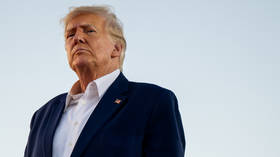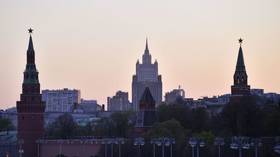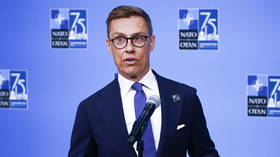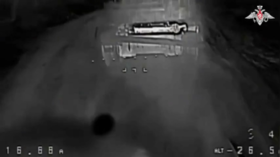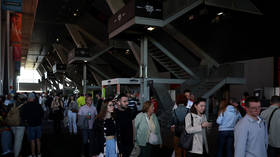Support for anti-Russia sanctions drops – poll

The number of Britons advocating harsh economic sanctions against Russia in response to its military offensive in Ukraine has dropped over the past month, according to a new opinion poll.
Conducted by Redfield and Wilton Strategies, and commissioned by The Sunday Telegraph, the survey indicates that only 36% of the respondents, polled this week, are prepared to accept higher fuel prices in order to hurt Russia more – 14 percentage points down from 50% in March.
A third of the Britons surveyed replied in the negative when asked if they were willing to pay more for food to help Ukraine withstand the Russian offensive. Around the same, however, said it’s a sacrifice worth making.
54% of the respondents reported a worsening of their financial situation in the last year, up from 42% two months ago, and 62% said they expect the future to be even bleaker.
More than two-thirds of Britons said they have not received a pay raise despite the growing cost of living, and most of those who did receive a raise said it’s not enough to offset inflation.
Based on these latest findings, The Telegraph surmised that personal financial woes may now have overshadowed concern over Russia’s military offensive against Ukraine in the eyes of the general public in the UK.
Since February 24, oil prices have shot up to levels unseen since 2008. And while they have ebbed in recent weeks, black gold is still far more expensive than before the start of the conflict, with one barrel of Brent crude oil going for more than $111 on Thursday.
Gas tariffs have also followed the upward trend, with all of the above translating into higher energy bills and gas prices for both individuals and businesses across Western Europe and North America. The increased cost of transportation has had a knock-on effect, leading to higher prices for groceries and other goods.
Britain, which in early March announced it would phase out all Russian oil imports by the end of the year, is no exception in terms of skyrocketing fuel prices.
The fuel spokesman for British automotive services company RAC, Simon Williams, told the media that “March 2022 will go down in the history books as one of the worst months ever when it comes to pump prices.” He also said that “to describe the current situation facing drivers at the forecourt as ‘bleak’” would be “something of an understatement.”
Figures released on Wednesday indicate that inflation in the UK hit the 7% year-on-year mark in March – the highest level since 1992.
Officials in Britain acknowledged early on after the start of Russia’s military campaign in Ukraine that sanctions on Moscow would result in economic blowback and hurt the UK, too. London went ahead with the punitive measures regardless, with Foreign Secretary Liz Truss arguing that the price would be much higher if Russia took over Ukraine.
Speaking on February 27, Truss emphasized that the “pain that we will face in the United Kingdom is nothing like the pain that people in Ukraine are currently facing.”
The UK, along with the US, EU, Canada, Japan, Australia, and several other nations have imposed several rounds of sanctions on Russia, targeting, among other things, its central bank’s assets, a number of top commercial banks, and entire industries. Some countries have announced plans to phase out Russian energy imports, oil and coal in particular.
Russia attacked the neighboring state in late February, following Ukraine’s failure to implement the terms of the Minsk agreements, first signed in 2014, and Moscow’s eventual recognition of the Donbass republics of Donetsk and Lugansk. The German and French brokered protocols were designed to give the breakaway regions special status within the Ukrainian state.
The Kremlin has since demanded that Ukraine officially declare itself a neutral country that will never join the US-led NATO military bloc. Kiev insists the Russian offensive was completely unprovoked and has denied claims it was planning to retake the two republics by force.






